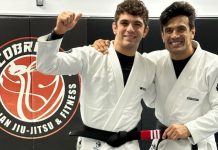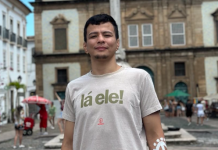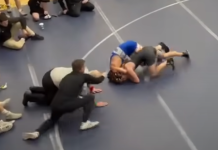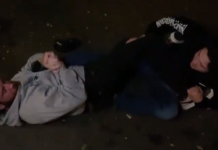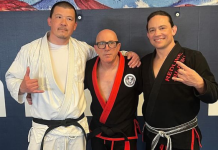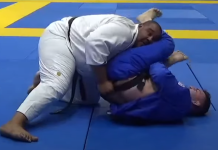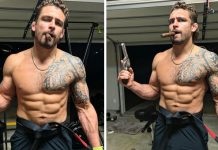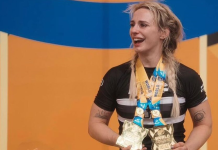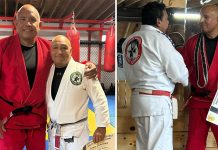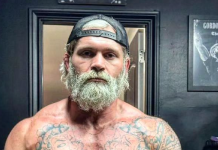It’s tough being a martial arts role model in 2019. Fans want their heroes to be interesting but average, flawed but not fucked up, principled but not political. If a fighter appears to be too perfect commenters post things like “who cares?” or “boring” under their photos, and if the athletes are human enough to struggle with addiction or personal problems they’re labeled “bad for the sport.” More than a few heroes have been blasted as cheaters and villains this week alone. Few practitioners who thrive on the mats can actually survive Social Media era scrutiny.
Jessica Munter is one of those rare athletes for all the right reasons.
A Para Jiu-Jitsu champion and IBJJF medalist, the 21-year-old is currently working her own way through college in between grueling training sessions at Imperial Jitz and Bellingham BJJ for both able-bodied and adaptive grappling competitions. She studies psychology and kinesiology, marrying the two with martial arts as she dreams up ways to one day help amputees and injured patients rehab their bodies through integrative physical therapy. Sometimes she works as an academic advisor for teenagers struggling to plan a financially sustainable academic future, helping them piece together affordable educations which translate into actual jobs when they graduate.
And when she’s not doing all that you can find her camped out in the woods cooking meals for firefighters combatting wildfires in her native Washington State. Yes, really.
The Hero’s Journey
As if all that wasn’t enough, the blue belt is very literally training those multiple mat sessions with one arm tied to her front.
Injured by a doctor’s error during birth, Munter lives, works, and fights with Erb’s Palsy, a brachial plexus injury that has left one arm so atrophied and weak from nerve damage that it’s safer to tie it to her body and compete with one arm than leave the limb susceptible for further damage.
“I have about 20%, maybe 30%, function on a good day and don’t have much of a grip on that side,” Munter explains, “so I just don’t use it for BJJ.”
As a competitor she used to leave her arm in the sleeve of her gi and request competitors not attack the damaged side, but that only worked until Munter got really good.
“People were respectful of [the injury] competition until I’d start to win,” she half sighs, “but they definitely attacked it when they started losing.” This is a serious problem for individuals with brachial plexus conditions, who have to undergo costly nerve therapies or surgeries when what is already damaged takes more punishment.
“When I was little I had to wear basically a whole body cast on that side for months to set the arm into position. My hand was stuck upward all the time like I was waving. It would be bad if I had to get back to that as an adult. I stress about breaking my good arm all the time because I’m like, ‘I need to write a paper tonight!’”
It wasn’t exactly good back during the body cast days, either. Therapy was painful and expensive, stressing her parents’ relationship. And of course Munter was bullied relentlessly by classmates for her injury, something that had been forced onto her while she was literally in the process of being born.
“Elementary school was hardest. People were young and naive, and some parents didn’t really teach respect to their kids,” she recalls. “Sometimes middle school girls would push or shove me. I was getting mocked for not looking like people with similar bodies.”
As a result the normally ebullient and playful Munter started to withdraw. She was forced to transfer schools to get away from the worst aggressors, entering what she called an “emo phase” as she struggled to find a place to fit. Munter subsequently threw herself into a local program called Running Start which allowed her to graduate high school early, a choice that accidentally set her on a collision course with jiu-jitsu.
BIG SWEATY GUYS
Having made it out of high school early but emotionally lost, Munter found some of the much needed space to grow into herself as she entered college. She even felt confident enough to show up at a random self defense seminar for women on campus, and to stay despite being the only attendee.
Alone and completely inexperienced with any kind of combat, Jess spent that defense seminar working with Imperial Jitz coach and owner Luis Alvarez who showed her grips, how to handle being grabbed, fighting stances, and attack prevention. At the end of the surprise private lesson, Alvarez invited to Jess to drop by his school sometime. She did the very next day.
“It was really cool feeling empowered enough to go and step into a room with all these big, wrestling men,” she says of the jump from campus seminar to BJJ student. “I come from a big hispanic family so I wasn’t unfamiliar with being around lots of guys, but these guys were—yeah, a bunch of big sweaty guys!” Big, sweaty guys who immediately made Munter feel at home by working together to adapt jiu-jitsu to fit the unique needs of her body.
Munter may have been more open than the average freshman to joining a stanky gym of perspiring monsters in part because of what she refers to as her “own big hispanic family.” Her uncle even ran a very active martial arts gym in her hometown of Moses Lake when she was young.
“But he was always sweaty and gross!” Munter remembers. “I’d go visit and see these huge men rolling and gross, and think how much that was NOT for me. Especially with a disability!” But as grown-up Jess began to assimilate into the Imperial family, she discovered she had been wrong.
“Jiu-Jitsu was this warm, welcoming place I could just be okay, be myself,” she says. “My team is big into community support. We work to promote positive change in our city because all of us have negative or challenging backstories, but none of us have to become those backstories.”
As Munter found her confidence through jiu-jitsu her father saw a video of beloved and slightly deranged para-BJJ athlete Brian Freeman, aka purple belt “WheelchairJitsu,” training with Professor Renzo Gracie on Facebook. Intrigued, he reached out to Freeman and explained his daughter’s situation. Freeman invited Munter to his Adaptive Grappling Summit, which is exactly what it sounds like, where she met a collection of confidence-building mat rats with an array of serious physical conditions that would make most “normies” quit sports and take up knitting.
Through Freeman, Munter become more aware of just how many people in jiu-jitsu use the art form to master bodies that are different from what you see at ADCC or Polaris. Jean Jacques Machado famously had a congenital hand deformity which left him with no grip…and absolutely no problem choking competitors unconscious on the mats. Quênia Victor, a partial amputee, was dominating competitions like Grand Slam Rio with one manicured hand. Nick Newell, MMA fighter, had recently become the XFC lightweight champ with a single glove to punch with. Diana Maddelon, a grappler and crossfitter, was competing in both with a brachial plexus injury just like Munter.
Motivated and connected to a new tribe of resilient athletes, Jess kept grinding away until she won the para-BJJ even SJJIF and caught the eye of the UAJJF, scoring an invite to Abu Dhabi for the Para Jiu-Jitsu Championships.
Suddenly, Munter found herself on an international jiu-jitsu stage facing Quenia Victor herself—the same manicured Brazilian Jess had been watching on Instagram as motivation during the two years it took to achieve her blue belt.
Jess beat her.
Munter was crowned the reigning Para BJJ champ in her division, solidifying her place as a standout in the adaptive grappling community and as a role model, period.
Get This Girl a Sponsor, Already
Today Munter has two things on her mind: Trying to raise the money to defend her title in Abu Dhabi on a college student’s budget, and raising awareness about the importance of adaptive grappling events in the community at large.
“Para Jiu-Jitsu is a mission outreach that shows we can fight at a competition level. We work to make a platform for fair and safe matches between able-bodied athletes and para athletes with no fear of injury,” she explains. It’s an effort that helps the whole community, as adaptive athletes set the standard for how injured athletes can train through recovery or continue in jiu-jitsu once the wear and tear of grappling takes its toll. “Hopefully we can get more people involved and show people scrolling on the internet there is a place for all of us.”
Munter’s teammates at Bellingham BJJ and Imperial Jitz currently have a GoFundMe set up to help Jess get back overseas to continue her inspirational jiu-jitsu journey. You should definitely donate to it by clicking here. Munter is also saving up to have a special splint designed to protect her damaged arm, so if you’re a gifted orthopedic sports specialist and/or rich, please do the right thing and get in touch.
You can learn more about Adaptive Grappling here or by contacting WheelchairJitsu here.





